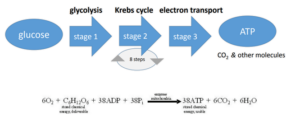< Previous ………. Next Topic >
Deep Dive: the Cell
Also See Topic (35) Use a model about cellular respiration resulting in net transfer of energy. (HS-LS1-7)
Cell biology is known as cytology. Cell biology is the study of the cell as a complete unit. This includes the molecular and chemical interactions that occur within a living cell.
Cell biology is concerned with several important properties and processes:
- environment & cell interactions
- physiological properties
- chemical composition
- metabolic processes
- signaling pathways
- cell life cycle
Cell biology is essential for research in bio-medical fields. Research into cancer and other diseases require a deep understanding of cells. Research in cell biology is closely related to genetics, biochemistry, molecular biology, immunology, and developmental biology. In particular, concepts related to cellular respiration are emphasized in this topic.
Material
Day 1 – Introduction
- Student Work Packet – Topic xx
Day 2 – Virtual Textbook
Enrichment
Day 1 – Introduction
- Student Work Packet – topic 44
Day 2 – Virtual Textbook
- cK12 Chapter 05 – Cellular Respiration (pdf)
- Read Biology 44 – Mitochondrion
- Read Biology 44 – Cell (biology)
- Read Biology 44 – Cancer cell
- Read Biology 44 – Mutation
- Read Biology 44 – Cloning
Enrichment
- Activity 15 – Write a letter
- Activity 20 – Venn diagram
- Activity 24 – Create matrix
- Activity 03 – Make slides
2:56 What is ATP?
11:03 Cell Membranes
6:22 Mitochondria and energy production
Compare Contrast and Debate
Extract from US News April 11, 2017 (full article).
In the U.S., it generally takes four years to earn a bachelor’s degree. However, undergraduate programs in a number of European countries are typically only three years long. The main difference is that U.S. programs include a lot of general education courses that many European programs don’t.
General education courses are often not directly related to a student’s major but are required to graduate. They tend to emphasize skills such as writing and critical thinking and expose students to a variety of subject areas.
American colleges regard general education as essential, and European universities do not, says Paul L. Gaston, trustees professor emeritus at Kent State University in Ohio. Gaston and other experts say European students are expected to gain this type of knowledge in high school and be ready to narrow their focus when they go to college.
- Position A: Studying “basics” in the US has tremendous value. The US should not change this approach.
- Position B: Studying “basics” in the US is somewhat a waste of time and money. The US should adopt the European approach.
Instructor Resources
Standard Daily Material
- Day 1 – Standard material – introduction day
- Day 2 – Standard material – reading day
- Day 3 – Standard material – make a presentation
- Day 4 – Standard material – give a presentation
- Extra! – Enrichment and remediation options
Other Topic Specific Resources
- Activity 15 Write a letter
Special Notes and Notices
Instructor Emphasis:
- Science & Engineering Practice: Engage in scientific argument from evidence.
- Cross-Cutting Concept: Energy and Matter: Flows, cycles, and conservation.
About us ……… Terms of use
